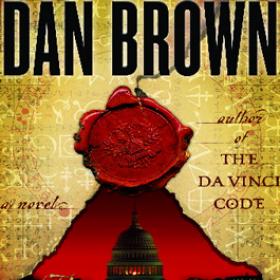The Lost Symbol By Dan Brown

3.5/5
The fact that Dan Brown has taken six years to deliver this follow up to The Da Vinci Code most likely drove his publishers, Doubleday, into a mad frenzy, but it also sent a reassuring message of comfort to his readers. No, he didn’t have any interest in branding himself, turning into the next James Patterson, or pumping out five books a year. And now that we have The Lost Symbol in our hands, we can see that the extra time we had to wait was well worth it as Brown, a gifted storyteller, has given us a book that is so thick with great plot twists, fascinating lectures, and mind boggling information on ancient cultures that it is impossible to deny its delectability.
It should also be noted that this is the first of his novels starring Robert Langdon (Brown’s go to hero, played by Tom Hanks in the movies) that takes place in the US, so his study of the rich architectural and artistic history that exists in Washington DC will almost certainly hit closer to home for his American readers. Sure, the version of history he is feeding us is propped up, but more than anything he wants to challenge his readers to think about the world around them and all of the crazy ways that everything is seemingly interconnected.
The storyline Brown goes with in The Lost Symbol will seem reheated to fans of The Da Vinci Code. Once again Robert Langdon finds himself on the run from religious authorities while trying to crack an ancient code – in this case one left behind by the Freemasons – while also trying to put the stoppers on an evil plot being hatched on the other side of town by a madman named Mal’akh. Mal’akh is fanatically and deliciously over the top in his attempt to decipher the hidden mysteries that are to be found in a stone pyramid closely guarded by the Freemasons.
Langdon finds himself in this mess after being lured to DC under false pretenses only to find the disembodied hand of his mentor Peter Soloman. Mal’akh’s brilliant plan is to force Langdon, master symbologist, to solve the puzzles of the pyramid or never again see his friend. Of course Brown’s main goal here to put out an immensely readable book so at times his techniques seem lowbrow. For example, he attempts to end every one of his 133 chapters with a cliffhanger, thus giving the book the feel of a glorified Hardy Boys mystery. But to hate on that is to miss the whole spirit of the experience.
More upsetting is Robert Langdon who remains problematic as a leading man. Entertainment Weekly raved about him saying he "remains a terrific hero, a bookish intellectual who’s cool in a crisis and quick on his feet, like Ken Jennings with a shot of adrenaline." He wishes. Ken Jennings had charisma; Robert Langdon has nothing more than a wooden personality, his encyclopedic knowledge and his Mickey Mouse watch (which is not nearly as quirky as he or Brown would have you believe). There is also, if we want to nitpick, the fact that the word "esoteric" is used so many times that the book could double as a rather daunting drinking game with the minimal application of imagination.
Probably still stinging from the lashing he took from the religious right after The Da Vinci Code (see: The Da Vinci Hoax by noted angry Catholic Carl E. Olsen), Brown seems to over compensate here and at times appears on the verge of begging for their forgiveness. His overall theme is the divinity of knowledge, but to him that doesn’t just mean shedding small-mindedness and accepting science even when it conflicts with your religion. He also takes shot at science, urging it to stop dismissing discoveries that would reinforce the idea of the human soul.
The Bible is also furnished with lavish praise, so hopefully those out there still holding a grudge can forgive and forget and buy this book because it is not one to be missed. After selling two million copies during its first week in print it is sure to be the number one blockbuster of the year, and it is everything a blockbuster should be up to and including the unavoidable softness. Make no mistake, the franchise is secure and Brown has no interest in playing for keeps. So as long as he can keep coming up with stories that reveal our deep, dark secrets, Robert Langdon (in all his glory) will be there to lead the way.
Author: Dan Brown
Publisher: Doubleday
Pages: 509
RELATED ARTICLES
Get the most-revealing celebrity conversations with the uInterview podcast!







Leave a comment